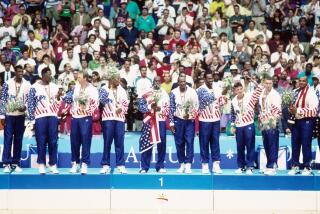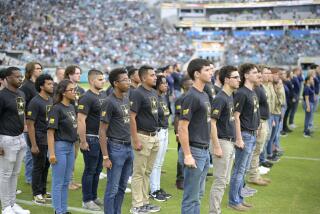These Athletes Answer to a Very Different Call
- Share via
On a shooting range in Utah, Jeremy Teela and Lawton Redman fight their own quiet battle.
It is the battle for concentration.
For the record:
12:00 a.m. Oct. 11, 2001 FOR THE RECORD
Los Angeles Times Thursday October 11, 2001 Home Edition Part A Part A Page 2 A2 Desk 1 inches; 29 words Type of Material: Correction
Olympics--Biathletes Jeremy Teela and Lawton Redman are on active duty in the Army, attached to a National Guard unit. Their military affiliation was incorrectly reported in Tuesday’s sports section.
Sgt. Redman and Spc. Teela are in the Army National Guard.
They also are training for the Winter Olympics.
Whether in February they will be in Salt Lake City, no one can say.
Redman and Teela are two of the top four American athletes in men’s biathlon, which combines cross-country skiing and rifle marksmanship--skills that might suddenly seem useful to the Army.
Their assignment as two of the roughly 70 soldiers in the Army’s World Class Athlete Program is to train for the Olympics.
Still, they are subject to deployment, and if the Vermont Guard unit they belong to is activated, Redman and Teela will report for duty.
“If the unit goes, I go,” said Teela, 24, a former Alaska state high school cross-country skiing champion who completed basic training in 1997. “I’m pretty sure it’d be automatic. I’m like any other soldier. No special treatment.”
He, Redman and 16 other hopefuls with Army ties who are training in the U.S. biathlon or bobsled programs know their Olympic dreams could end suddenly.
“If my unit goes and I had a choice, I’d still rather go,” Teela said. “Some things are more important. There will always be another Olympics in four more years. So you’d delay.
“There are other things in life that mean a lot. A lot of those people [at the World Trade Center and Pentagon] had plans also.”
Scattered across the country, athletes with military backgrounds wait to see if they might be called to duty as athletes such as Ted Williams, Warren Spahn and Bob Feller were in another generation.
Two NFL players, backup linebacker Chris Gizzi of the Green Bay Packers and backup defensive end Bryce Fisher of the Buffalo Bills, are Air Force reservists. Graduates of the U.S. Air Force Academy, each is serving out his obligation after two years of active duty.
“You wait every day to see if you get a call to go to a different mission,” Gizzi said. “Up until then, you’ve got to continue doing what your job is now.”
Most of Gizzi’s work for the Air Force has involved recruiting and public relations, and he points out that as a psychology major in college, he isn’t about to fly a jet..
“To echo the president’s words, for some of us, the battle every day is to do our jobs and return to normalcy.”
Some athletes, however, already have answered the call.
At Clark Atlanta University, a Georgia school with a Division II football program, a defensive tackle and defensive back already have departed.
Army Special Forces reservist Dwight Williams and Marine reservist Agyie Pittman left the team to report to duty the day after the attack.
At Mt.San Jacinto College, a community college with strong ties to Camp Pendleton, seven players on the football team are reservists.
Running back Leonard Demery, a former Marine truck driver, learned of the Sept. 11 attacks when he was awakened by a phone call from a staff sergeant.
“They just said, ‘Be prepared,”’ Demery said. “When I signed up, I knew this was a possibility. Of course you hope not to go ... but we know we’re pretty much on standby.”
In Utah, the U.S. biathlon hopefuls spend their days in silent concentration on the rifle range, and until the snow comes, on ski simulators known as roller skis.
In the days after the initial attack, they struggled to keep their hands steady and their eyes on the targets in front of them.
“The sport is all about focusing and blocking things out,” Teela said. “It’s a part of biathlon, when you’re trying to shoot a target in Germany and there are 30,000 people behind you, yelling in the stands.”
Now that retaliation by U.S. and British forces has begun, the athletes’ ability to focus is being tested again.
“I was working on my pickup truck Sunday when one of my teammates said we had started bombing Afghanistan. I wasn’t really surprised. I was expecting it,” said Redman, 25, like Teela an infantryman. He completed basic training in 1999 after graduating from St. Lawrence University in New York, where he was a standout cross-country skier and runner.
If they are deployed, their duty could be almost anything.
“I don’t really know if we’d be a support unit for another army base in the U.S. or go overseas,” Teela said.
And so they wait.
More to Read
Go beyond the scoreboard
Get the latest on L.A.'s teams in the daily Sports Report newsletter.
You may occasionally receive promotional content from the Los Angeles Times.






